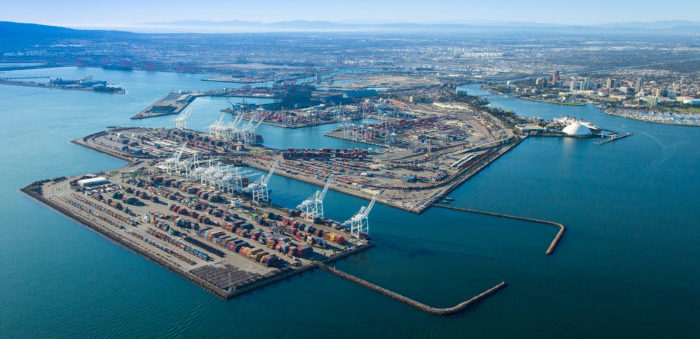In order to achieve zero-emissions operations, the Port of Long Beach will use a $5.3 million grant from the California Air Resources Board (CARB) to deploy hydrogen- and electric-powered cargo-handling equipment at two shipping terminals.
The funds for the Commercialization of POLB Off-Road Technology Demonstration Project (C-PORT) is part of California Climate Investments, a statewide initiative that aims to reduce GHG emissions, strengthening the economy and improving public health and the environment.
[smlsubform prepend=”GET THE SAFETY4SEA IN YOUR INBOX!” showname=false emailtxt=”” emailholder=”Enter your email address” showsubmit=true submittxt=”Submit” jsthanks=false thankyou=”Thank you for subscribing to our mailing list”]
The demonstration will include three cargo-moving vehicles known as ‘top handlers’ with newly tested battery-electric systems. The project will also feature a head-to-head comparison of hydrogen fuel cell vs. battery-electric technology in yard trucks.
In total, five vehicles will be showcased:
- Two battery-electric top handlers at SSA Marine’s Pacific Container Terminal at Pier J;
- One fuel cell yard tractor,
- One battery-electric top handler
- One battery-electric yard tractor at Long Beach Container Terminal at Pier E.
As Harbor Commission President Lou Anne Bynum said, the Port has reduced diesel emissions almost 90% since adopting the Clean Air Action Plan in 2005.
The equipment will be put into use to begin the demonstration next year. As part of the project, information about the demonstration will also be incorporated into the coursework at the Port-sponsored Academy of Global Logistics at Cabrillo High School to support education and workforce development for new port technologies.
In June, the Port of Long Beach moved ahead with a $16.8 million project to build infrastructure to support electric-powered, zero-emissions cargo-handling equipment, and to demonstrate the world’s first heavy-duty, off-road, direct current fast-charging system in a seaport environment.
Partly funded by an $8 million California Energy Commission grant, the Port Advanced Vehicle Electrification (PAVE) Project supports the first phase of a transition to a zero-emissions future at Total Terminals International’s container terminal at Pier T, the port’s largest.
The PAVE Project will design and build charging outlets for almost 40 pieces of electrical terminal equipment at TTI. Four battery-electric yard tractors will be modified to connect to a DC fast-charging system.






























































